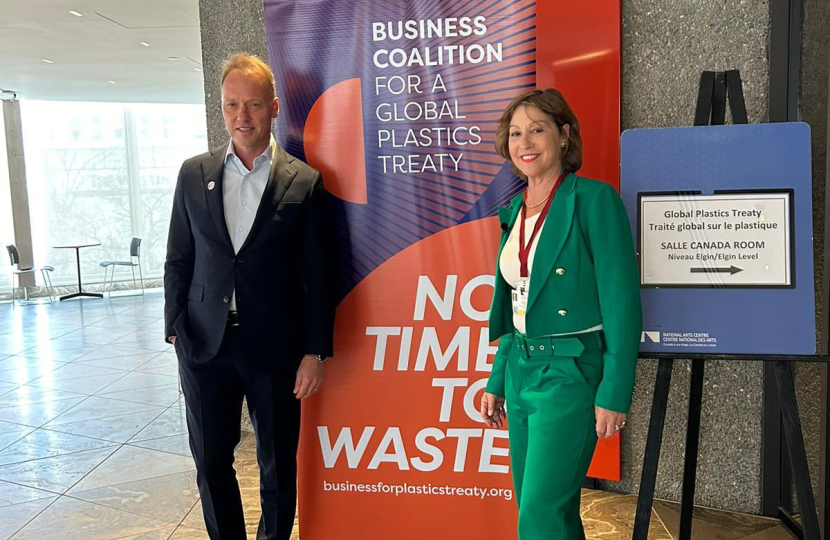
Local MP and Environment Minister Rebecca Pow working on an ambitious global Plastics Treaty to end plastic pollution
Taunton Deane MP and Environment Minister Rebecca Pow is working with global leaders to secure a highly ambitious, effective Plastics Treaty by the end of 2024. It is aimed at ending plastic pollution by 2040.
The UK has been a vocal proponent of a strong and comprehensive agreement that covers the whole lifecycle of plastics, including restraining and reducing the production and consumption of plastic to sustainable levels, promoting a circular economy for plastic, managing plastic waste in an environmentally sound and safe manner, and preventing and reducing releases of plastics into the environment.
The United Nations Environment Assembly Resolution set an ambitious timetable for the agreement of a new international, legally binding plastics treaty by the end of 2024.
More broadly, the Resources and Waste Strategy for England sets out the Government’s plans to reduce, reuse, and recycle more plastic and Ministers have committed to work towards all plastic packaging on the market being recyclable or reusable by 2025. A range of measures have already been introduced to drive this change.
Local MP Rebecca Pow said:
“Locally I know that there is much support for cutting plastic that harms the environment and for the measures this Government has already taken to address plastic pollution. This includes a ban on the use of microbeads in rinse-off cosmetics and personal care products (I started a campaign on this as a back-bencher) and restricting the supply of a whole range of single use plastics items - plastic straws, plastic drink stirrers, plastic-stemmed cotton buds and some polystyrene containers. And we've just announced we will be legislating to ban wet wipes containing plastic. The charge for single-use carrier bags in supermarkets has proved popular resulting in an over 98% reduction in plastic carrier bag use.
As Environment Minister I attended the latest round of negotiations on the International Plastics Treaty representing the UK Government alongside fellow Environment Ministers from across the globe. With plastics in the ocean set to treble by 2040 we need and must act fast to stem this unacceptable tide of pollution which is why the Treaty is so crucial.
As a member of the High Ambition Coalition, the UK has continued to push for an ambitious treaty covering the full lifecycle of plastics. There remains substantial differences between parties on the level of ambition for the treaty, which has meant that progress has been slower than we would have hoped on some key areas.
Nonetheless the UK was able to incorporate its proposal on problematic and avoidable plastics into the draft treaty text, and we are pleased that countries have agreed to progress these plans in the coming months. There remains significant work to do to secure an agreement at the final negotiations in November, and the UK is committed to securing the best outcome for our oceans, communities and wildlife.”
Government action to reduce plastic:
- Restrictions on a range of single-use plastics, including plastic plates, trays, bowls, cutlery, balloon sticks and certain types of polystyrene cups and food containers have now come into force. England uses 2.7 billion items of single-use cutlery and over 700 million single-use plates per year, but only 10 per cent are recycled. This new ban is the next step in cracking down on harmful plastic waste.
- Ban on wet wipes containing plastic: The UK Government will introduce new world-leading legislation to ban wet wipes containing plastic. Wet wipes containing plastic break down into microplastics over time, which research shows can be harmful to human health and disrupt our ecosystems – with a recent survey showing an average of 20 wet wipes were found per 100 metres of beach surveyed across the UK.
- The Plastic Packaging Tax, which came into effect in April 2022, applies to plastic packaging with less than 30 per cent recycled content, and is charged at £200 per tonne. This tax applies to plastic packaging manufactured in or imported into the UK. The tax provides a clear economic incentive for businesses to use recycled plastic in the manufacture of plastic packaging.
- The introduction of an Extended Producer Responsibility scheme will also encourage businesses to think carefully about how much plastic packaging they use, to design and use plastic packaging that is easily recyclable and encourage use of reusable and refillable packaging. These measures will reduce plastic waste and divert plastic packaging away from landfill and incineration.
- Through the Environment Act 2021, the Government has set a target to halve residual waste by 2042. This refers to waste that is sent to landfill, put through incineration, or used in energy recovery in the UK or overseas. This is an intentionally broad target, which will include the most environmentally harmful materials like plastics, rather than banning a single type of material and risk producers moving to a different, more harmful material.
